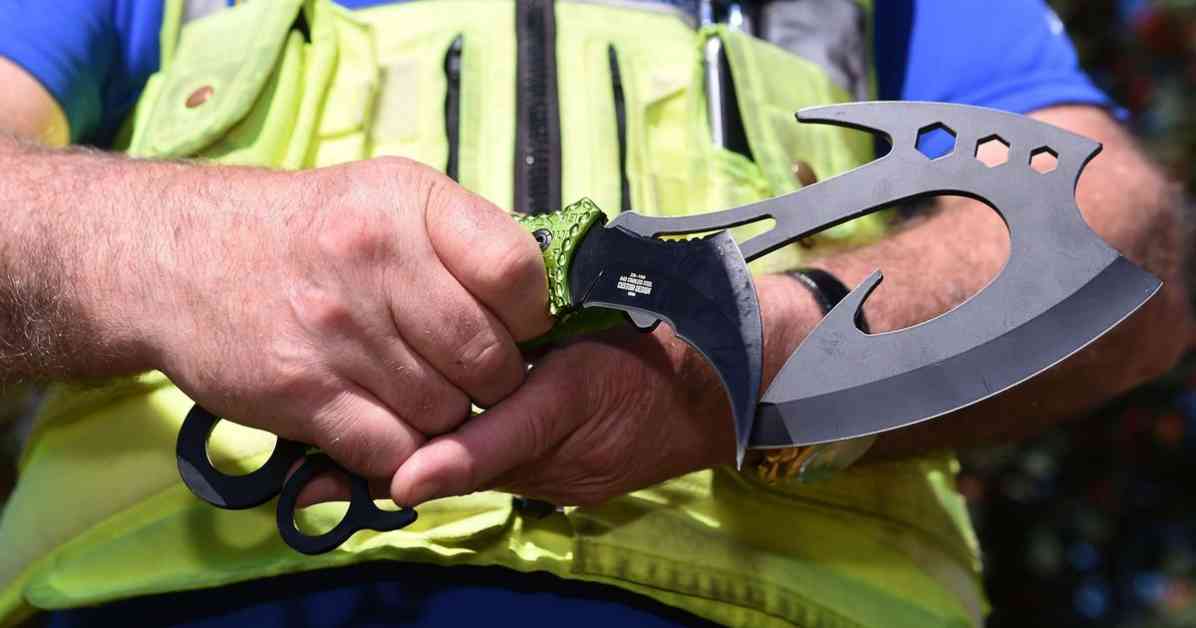The UK Implements a Ban on Zombie Knives: A Comprehensive Look at the New Legislation
In a bid to combat rising knife crime, the UK has recently implemented a ban on zombie knives, effective as of today. This new legislation aims to close a legal loophole that previously allowed the possession, creation, distribution, or sale of certain types of “statement” knives, which have been popular within criminal circles. The ban specifically targets zombie-style knives and machetes with blades longer than eight inches (20cm) and usually featuring a serrated edge designed for cutting.
The push for this ban has been supported by various advocates, including actor Idris Elba, who have been campaigning for stricter measures to address the issue of knife-related violence. In an effort to encourage compliance with the new law, an amnesty period was provided along with compensation incentives for individuals to surrender their prohibited weapons.
Mapping Knife Crime Hotspots: A Closer Look at the Data
Recent data released by the BBC from Freedom of Information requests has shed light on the prevalence of knife-related incidents across England and Wales. In 2023, police forces reported over 14,000 incidents involving zombie knives, machetes, or swords, marking a significant increase from the 7,159 instances reported in 2019. Machetes, in particular, were involved in nearly 10,000 offenses last year alone, representing a troubling trend of escalating knife crime.
According to statistics from the Home Office, the 12-month period ending in March 2024 saw over 51,000 serious criminal cases involving knives, including offenses such as murder, rape, robbery, assault, and sexual offenses. This figure is nearly double the number reported for the same period ten years prior, highlighting the concerning rise in blade-related crimes.
Knife Crime on the Rise: A Disturbing Trend
Knife crime statistics reveal a worrying trend, with 27,500 offenses of possessing a knife recorded last year. While this marks a slight decrease from the previous year, it remains over three times higher than the 9,000 incidents reported a decade ago. Birmingham has emerged as the epicenter of knife-carrying incidents, with a staggering 5,880 offenses reported over the past three years, making it the UK’s knife-carrying capital.
Following Birmingham, other areas such as Blackpool, Wolverhampton, and Crawley have also reported high rates of knife possession, with Crawley standing out with an extraordinary rate of 943 offenses per 100,000 people. However, this figure may be skewed due to the presence of Gatwick Airport in the town, which attracts a high volume of international travelers.
The Impact of the Zombie Knife Ban
The new legislation banning zombie knives and similar weapons aims to curb the prevalence of dangerous blades in society. Under the ban, it is now illegal to possess, sell, or manufacture zombie-style knives, which are characterized by their cutting edge, serrated edge, and imagery or wording suggestive of violence. Retailers and the public were given until today to surrender these weapons and receive a standard compensation of £10.
The maximum sentence for carrying a knife in a public place or possessing a banned knife is four years in prison. While the ban has been welcomed by the National Police Chiefs’ Council, it is acknowledged that legislative measures alone are not sufficient to address the root causes of knife crime. Efforts to deter young people from violence and promote alternative pathways must be part of a comprehensive strategy to combat knife-related offenses.
Emerging Technologies to Combat Knife Crime
Innovations in technology offer potential solutions to address knife-related violence. Tech experts are currently developing a new system that could enable police to identify individuals carrying knives from a distance. This prototype technology, which may be initially deployed in crowded settings such as concerts or train stations, would scan individuals as they move between two points, eliminating the need for conventional detection arches. This cutting-edge technology holds promise for enhancing law enforcement efforts in the fight against knife crime.
Conclusion
The ban on zombie knives in the UK represents a significant step towards reducing knife-related violence and improving public safety. By targeting dangerous blades with the potential for harm, the legislation aims to disrupt criminal networks and prevent tragedies resulting from knife crimes. While legislative measures play a crucial role in addressing the issue, a multi-faceted approach that includes community engagement, education, and support for at-risk individuals is essential to creating lasting change. As efforts continue to combat knife crime, the implementation of innovative technologies and the commitment of law enforcement agencies will be instrumental in ensuring the safety and well-being of all members of society.












